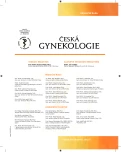Robotic sacrocolpopexy – two case reports and literature overview
Authors:
Z. Maškulíková; M. Studničková
; D. Neubert; R. Pilka
Authors‘ workplace:
Gynekologicko-porodnická klinika, LF UP a FN, Olomouc, přednosta prof. MUDr. R. Pilka, Ph. D.
Published in:
Ceska Gynekol 2015; 80(5): 372-377
Overview
Objective:
To describe first two cases of robotic sacrocolpopexy in the Czech Republic.
Design:
Two case reports with literature overview.
Setting:
Department of Obstetrics and Gynaecology, Faculty of Medicine and Dentistry, Palacky University in Olomouc.
Case report:
Robotic sacrocolpopexy was performed in two patients of the age 36 and 59 at the department of obstetrics and gynecology in Olomouc in 2009. We describe vaginal prolapse treatment in one case, and supracervical hysterectomy with cervicosacropexy in the other. These two cases are compared with literature overview, including long-term follow-up.
Conclusion:
Robotic sacrocolpopexy encompasses all advantages of minimally invasive surgery. Our results, as well as published data show very good long term results of vaginal prolapse treatment using this approach.
Keywords:
robotic surgery, sacrocolpopexy, vaginal prolapse, supracervical hysterectomy, daVinci
Sources
1. Akl, MN., Long, JB., Giles, DL., et al. Robotic-assisted sacrocolpopexy: technique and learning curve. Surg Endosc, 2009, 23(10), p. 2390-2394.
2. Anger, JT., Mueller, ER., Tarnay, C., et al. Robotic compared with laparoscopic sacrocolpopexy: a randomized controlled trial. Obstet Gynecol, 2014, 123(1), p. 5–12.
3. Benson, AD., Kramer, BA., Wayment, RO., et al. Supracervical robotic-assisted laparoscopic sacrocolpopexy for pelvic organ prolapse. JSLS, 2010, 14(4), p. 525–530.
4. DeLancey, JO. Anatomic aspects of vaginal eversion after hysterectomy. Am J Obstet Gynecol, 1992, 166(6 Pt 1), p. 1717–1724, discussion 1724–1728.
5. Descargues, G., Bouzouita, A., Grise, P. [Infectious spondylodiscitis after a laparoscopic sacrocolpopexy: about one case]. Gynecol Obstet Fertil, 2009, 37(2), p. 183–185.
6. Di Marco, DS., Chow, GK., Gettman, MT., et al. Robotic-assisted laparoscopic sacrocolpopexy for treatment of vaginal vault prolapse. Urology, 2004, 63(2), p. 373–376.
7. Elliott, DS., Frank, I., Dimarco, DS., et al. Gynecologic use of robotically assisted laparoscopy: Sacrocolpopexy for the treatment of high-grade vaginal vault prolapse. Am J Surg, 2004, 188(4A Suppl), p. 52S–56S.
8. Elliott, DS., Krambeck, AE.,Chow, GK. Long-term results of robotic assisted laparoscopic sacrocolpopexy for the treatment of high grade vaginal vault prolapse. J Urol, 2006, 176(2), p. 655–659.
9. Geller, EJ., Parnell, BA., Dunivan, GC. Robotic vs abdominal sacrocolpopexy: 44-month pelvic floor outcomes. Urology, 2012, 79(3), p. 532–536.
10. Geller, EJ., Siddiqui, NY., Wu, JM., et al. Short-term outcomes of robotic sacrocolpopexy compared with abdominal sacrocolpopexy. Obstet Gynecol, 2008, 112(6), p. 1201–1206.
11. Hach, CE., Krude, J., Reitz, A., et al. Midterm results of robot-assisted sacrocolpopexy. Int Urogynecol J, 2015.
12. Huguier, J., Scali, P. [Surgical procedure adapted from bladder neck suspension; 10 new cases of prolapse after hysterectomy]. Bull Fed Soc Gynecol Obstet Lang Fr, 1957, 9(3), p. 289–292.
13. Khan, A., Alperin, M., Wu, N., et al. Comparative outcomes of open versus laparoscopic sacrocolpopexy among Medicare beneficiaries. Int Urogynecol, J 2013, 24(11), p. 1883–1891.
14. Krcmar, M., Halaska, M., Zahumensky, J., et al. [A survey of surgical techniques used for the correction of statics disorders of pelvic floor]. Ces Gynek, 2006, 71(6), p. 464–468.
15. Maher, C., Feiner, B., Baessler, K., et al. Surgical management of pelvic organ prolapse in women. Cochrane Database Syst Rev 2010(4):CD004014.
16. Manodoro, S., Werbrouck, E., Veldman, J., et al. [Laparoscopic approach in the pelvic floor surgery]. Ces Gynek 2011, 76(6), p. 418–424.
17. Martan, A. Nové operační a léčebné postupy v urogynekologii. Praha: Maxdorf Jessenius, 2013.
18. Nygaard, IE., McCreery, R., Brubaker, L., et al. Abdominal sacrocolpopexy: a comprehensive review. Obstet Gynecol, 2004, 104(4), p. 805–823.
19. Olsen, AL., Smith, VJ., Bergstrom, JO., et al. Epidemiology of surgically managed pelvic organ prolapse and urinary incontinence. Obstet Gynecol, 1997, 89(4), p. 501–506.
20. Paraiso, MF., Jelovsek, JE., Frick, A., et al. Laparoscopic compared with robotic sacrocolpopexy for vaginal prolapse: a randomized controlled trial. Obstet Gynecol, 2011, 118(5), p. 1005–1013.
21. Pilka, R. Robotická chirurgie v gynekologii. Praha: Maxdorf Jessenius, 2014.
22. Ploumidis, A., Spinoit, AF., De Naeyer, G., et al. Robot-assisted sacrocolpopexy for pelvic organ prolapse: surgical technique and outcomes at a single high-volume institution. Eur Urol, 2014, 65(1), p. 138–145.
23. Siddiqui, NY., Geller, EJ.,Visco, AG. Symptomatic and anatomic 1-year outcomes after robotic and abdominal sacrocolpopexy. Am J Obstet Gynecol, 2012, 206(5), p. 435 e1–5.
24. Struppl, D. Da Vinci sakrokolpopexe v chirurgii urogenitálního prolapsu, přehledový článek. Endoskopie, 2011, p. 20.
25. Wattiez, A., Mashiach, R., Donoso, M. Laparoscopic repair of vaginal vault prolapse. Curr Opin Obstet Gynecol, 2003, 15(4), p. 315–319.
Labels
Paediatric gynaecology Gynaecology and obstetrics Reproduction medicineArticle was published in
Czech Gynaecology

2015 Issue 5
-
All articles in this issue
- Robot assisted endometrial cancer staging – evaluation the first 100 operations and comparing the first andthe last 30 operations
- Diaphragmatic surgery in advanced ovarian cancer therapy
- Radical fertility preserving surgery of gynaecological malignancies – five-year-old file
- Efficacy of surgical treatment of stress urinary incontinence with mini-invasive single incision sling
- Correlation of subjective and objective assessment of vaginal prolapse surgery – secondary analysis of randomized controlled study in patients with pelvic floor injury treated with vaginal mesh or with sacrospinous ligament fixation
- Mental changes in women due to the use of hormonal contraception
- Histological types of uterine fibroids in reproductive age and postmenopausal women
- Robotic sacrocolpopexy – two case reports and literature overview
- Heterotopic pregnancy after spontaneous conception
- Caesarean scar pregnancy – case report
- Delivery modes and the neonatal outcomes of low birth-weight neonates in a Brazilian reference health center
- Czech Gynaecology
- Journal archive
- Current issue
- About the journal
Most read in this issue
- Mental changes in women due to the use of hormonal contraception
- Histological types of uterine fibroids in reproductive age and postmenopausal women
- Heterotopic pregnancy after spontaneous conception
- Diaphragmatic surgery in advanced ovarian cancer therapy
